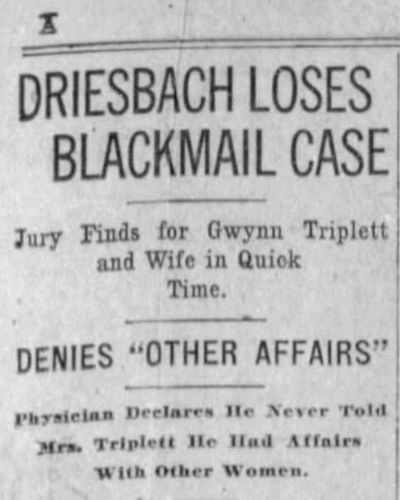This column reflects the opinion of the writer. Learn about the differences between a news story and an opinion column.
100 years ago in Spokane: A doctor’s claim that a couple tried to extort him backfired when his own misdeeds were revealed in court

A sensational blackmailing case involving an Opportunity physician ended in acquittal.
Mr. and Mrs. Gwynn Triplett were found not guilty of trying to extort money from Dr. C.W. Driesbach. The Tripletts claimed the doctor made a pass at Mrs. Triplett, and the doctor claimed they later tried to get him to pay for their silence.
The case against the Tripletts was weakened when the prosecutor conceded that the doctor admitted that he “had done wrong,” but that it was merely a “minor flirtation.”
The case was further weakened when Mrs. Triplett testified that the doctor forced her to sit on his lap and “accept kisses.” The doctor claimed this was “mutual.”
“The prosecutor refers to it as a mere flirtation,” said the Triplett’s lawyer. “… Can one say a reputable physician would do that? Who was to blame, that physician or that young wife? Are you going to blame the affair on this mere girl?”
The jury deliberated only a short time before finding the Tripletts not guilty. Apparently there was little proof of any extortion attempt.
From the hobo beat: Daniel B. Briggs, 25, of Spokane returned home after years of seeing the world – first as a soldier in the British army and then as a hobo, traveling around the U.S.
Briggs said that railroads proved lenient in allowing him and his fellow hobos to hop trains for free.
“The best experience of that was in Minnesota,” he said. “I climbed onto the roof of a passenger train and there must have been 60 men up there. I counted 18 on the tender. At the first station, the conductor came up and looked us over. ‘B’gosh,’ he said. ‘There are more passengers up here than there are in the coaches.’”
The worst experience was in a boxcar heading home in winter, across Minnesota, North Dakota and Montana.
“The only way a man in a boxcar can save his life in the cold is to keep moving,” he said. “I walked for hour after hour, swinging my arms and stamping my feet as the train pulled slowly along.”